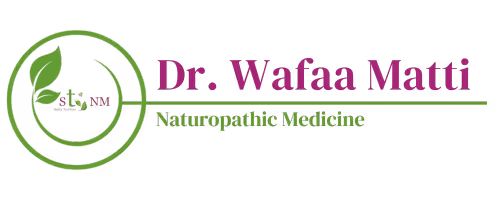
If your digestion, mood, or sleep feel off after the holidays, you’re not alone. Between festive gatherings, sugary treats, and a few extra glasses of wine, it’s completely normal for your body to feel a little “off balance” this time of year. The holidays are meant for joy, connection, and yes—even indulgence. But when the celebration ends, many people find themselves bloated, sluggish, or craving sugar again by mid-January.
Here’s the truth: this doesn’t mean you’ve done any harm. It simply means your body is asking for a reset — not punishment. Discover how to gently reset your body after holiday overeating—without starving or extreme cleanses. Learn Dr. Wafaa Matti’s naturopathic, science-backed strategies to restore balance naturally and get your energy, digestion, and mood back on track.
During the holidays, rich foods, excess sugar, alcohol, and irregular sleep can all take a toll on your metabolism and inflammation levels. These indulgences can leave your liver working overtime, your gut microbiome imbalanced, and your hormones temporarily disrupted. But instead of reacting with restriction, functional nutrition teaches us to rebuild from within — with nourishment, hydration, and support for your body’s natural detox pathways.
At Dr. Matti’s integrative practice in Encinitas, the focus isn’t on deprivation—it’s on restoration. Using the principles of functional nutrition and holistic detoxification, she helps patients reset digestion, stabilize energy, and support the body’s natural cleansing systems after periods of overindulgence.
What Happens to Your Body After Holiday Overeating
Understanding what’s happening inside helps you recover more gracefully. When you overload your system with sugar, processed foods, and alcohol, your digestive and hormonal systems respond in predictable ways:
Digestive Overload
Heavy meals, desserts, and alcohol can slow gastric emptying, leaving you feeling bloated or uncomfortable. The liver, which filters everything you eat and drink, must work harder to metabolize fats and toxins—especially after alcohol or fried foods.
Blood Sugar Imbalance
Excess sugar and refined carbs cause insulin spikes, followed by sudden energy crashes. These fluctuations can increase sugar cravings and fatigue, making it difficult to get back into balanced eating.
Inflammation & Bloating
Foods high in gluten, dairy, or processed oils can trigger inflammatory responses, leading to puffiness, fluid retention, and brain fog. Alcohol and dehydration further compound these effects by disrupting your electrolyte balance.
Mood & Energy Shifts
The gut-brain connection means that digestive stress affects mood and focus. Poor sleep, sugar crashes, and gut inflammation can lower serotonin levels, leaving you feeling moody or unmotivated after the holidays.
Why Starving Yourself or “Detox Teas” Don’t Work
After indulging, it’s tempting to go to extremes—fasting for days, skipping meals, or trying trendy “detox teas.” But these quick fixes can actually slow your recovery and disrupt your metabolism.
Metabolism Impact
Severe calorie restriction may cause rapid weight fluctuations but slows down metabolic rate and increases fatigue. It also stresses the adrenal glands, which regulate energy and stress hormones.
Liver Misconceptions
The liver doesn’t need a harsh cleanse or “flush.” What it needs are nutrients—like B vitamins, glutathione, and antioxidants—to convert toxins into forms your body can safely eliminate. Over-the-counter “detox” teas often lack evidence and may even dehydrate you.
Hormone Disruption
Skipping meals or severely restricting calories elevates cortisol (your stress hormone), which encourages fat storage—especially around the abdomen. This hormonal rebound is why many people feel worse after an extreme detox.
Naturopathic Insight
True detoxification is about nourishment, not punishment. Dr. Wafaa Matti teaches that the most effective way to restore balance is by providing your body the fuel it needs to recover—clean proteins, colorful vegetables, hydration, and rest. When your body feels supported, it naturally resets its metabolism and inflammation levels.
How to Reset the Right Way — A Functional Nutrition Approach
When your system feels sluggish after the holidays, the solution isn’t restriction—it’s restoration. Your body wants to recover; it just needs the right environment to do it. Dr. Wafaa Matti’s functional nutrition reset focuses on hydration, nourishment, and gentle detoxification that supports your natural physiology instead of fighting against it.
Rehydrate and Rebalance
Start your reset by focusing on the simplest and most powerful tool: water. After a few days of alcohol, sugar, and caffeine, your body is often mildly dehydrated—one of the leading causes of fatigue, headaches, and bloating.
- Morning ritual: Begin your day with a glass of filtered water with fresh lemon or a few drops of chlorophyll. Both help stimulate liver enzymes and support healthy lymphatic flow.
- Restore minerals: Add a pinch of sea salt, trace mineral drops, or an electrolyte packet to your water to replace what was lost through alcohol and sugary foods. Proper hydration also helps your kidneys and liver flush out metabolic waste more efficiently.
Focus on Liver & Gut Support
Your liver and gut are the body’s main detox engines. After heavy meals, refined sugar, or alcohol, they need targeted nutrients—not “cleanses.”
- Liver-loving foods: Fill your plate with cruciferous vegetables such as broccoli, kale, and Brussels sprouts. These contain compounds that activate phase II liver detox enzymes. Add garlic, beets, and turmeric for extra antioxidant and bile-stimulating support.
- Gut repair: Strengthen your microbiome with fermented foods like sauerkraut, kefir, or unsweetened yogurt. Pair these with prebiotic fiber sources like onions, leeks, flaxseed, and asparagus to feed beneficial bacteria.
Functional Tip: For those who want additional clinical-grade support, Dr. Matti often recommends a Fullscript detox bundle featuring NAC (N-acetyl cysteine), milk thistle, and liposomal glutathione. These nutrients enhance the liver’s ability to neutralize toxins and promote antioxidant balance—without harsh cleansing reactions.
Stabilize Blood Sugar
After days of sweets and celebratory cocktails, your blood sugar may be on a rollercoaster. Rebalancing it is key to restoring steady energy and curbing cravings.
- Balanced meals: Eat every 4–5 hours and combine protein, healthy fat, and fiber at each meal—think salmon with quinoa and greens, or eggs with avocado and vegetables.
- Smart carbs: Choose low-glycemic foods like lentils, leafy greens, quinoa, and cinnamon to support insulin sensitivity.
- Don’t skip meals: Skipping meals to “make up” for overeating can actually backfire by raising cortisol and increasing hunger later in the day. Instead, aim for consistency and nutrient density.
Move to Detox, Don’t Punish
Movement stimulates circulation, lymphatic drainage, and mood-enhancing endorphins—all essential for post-holiday recovery. But this isn’t the time for punishment workouts.
- Gentle activity: Go for a brisk walk, try light yoga, or spend 10–15 minutes rebounding (mini-trampoline exercises) to activate your lymphatic system.
- Avoid overtraining: After indulgence, the body is often inflamed and low on electrolytes. Excessive, high-intensity workouts can spike cortisol and delay recovery. Instead, choose movement that rejuvenates, not depletes.
Sleep & Stress Reset
Your body does its best detoxification while you sleep—especially in the liver’s active window between 11 p.m. and 3 a.m. Skimping on rest interferes with metabolism, mood, and appetite regulation.
- Aim for 7–9 hours of quality sleep each night to allow your organs and hormones to recalibrate.
- Wind down naturally: Practice deep breathing, limit screens after dark, and sip herbal teas like chamomile or lemon balm.
- Epsom salt baths can soothe sore muscles and provide magnesium for relaxation and detox support.
Nourish, Don’t Punish — Your Reset Starts Here
Resetting after the holidays isn’t about deprivation—it’s about listening to your body, replenishing nutrients, and supporting your natural detox pathways. When you choose nourishment over restriction, your body responds quickly: digestion improves, energy returns, and mental clarity follows. With the right guidance, these positive shifts can begin within days.
Your body already knows how to heal—it just needs gentle, functional support. Dr. Wafaa Matti’s holistic approach combines nutritional medicine, functional testing, and personalized care to help you recover balance after any season of indulgence. Whether you’re feeling sluggish from holiday meals or simply want to refresh your metabolism for the new year, her evidence-based protocols can help you restore vitality from the inside out.
Ready to Begin Your Functional Nutrition Reset?
📞 Schedule a consultation with Dr. Wafaa Matti to create your custom post-holiday reset plan and explore Fullscript detox support options tailored to your unique needs.
🌿 Location:
Stengler Center for Integrative Medicine
324 Encinitas Blvd, Encinitas, CA 92024
📧 Email: clinic@drwafaamatti.com
🌐 Website: drwafaamatti.com
📱 Phone: 760-274-2377
💬 Connect with Dr. Matti:
Instagram | Facebook | LinkedIn | YouTube
.svg)
Explore Our Latest Insights
Discover tips for better digestive health.
Ready to Take the Next Step?
Reach out today to schedule your visit or ask a question—Dr. Wafaa’s team is here to support your wellness journey, both in person and online.


